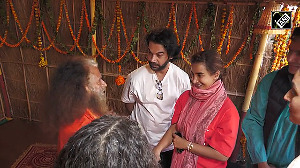In order to better utilise the excess of water flowing in the rivers in northern India, diversification to the needy southern states is much needed now, Tamil Nadu Agriculture Minister, Veerapandi S Arumugam said.
Linking the Ganges and the Cauvery was the only solution, Arumugam said while participating in the third International Groundwater Conference in Coimbatore on Wednesday.
This would also help in improving the ground water levels in the rivers of southern states, he said and requested the Centre for taking initiatives for the linking of Ganges and Cauvery.
The inter-linking of the rivers, particularly that of Maharashtra, Kerala, Karnataka, Andhra Pradesh and Tamil Nadu would benefit the drought prone states by diverting the flood waters, which was going waste in the sea, he said.
By diverting the water to the needy states, the ground water level in these states would improve much and would be helpful for better production of agricultural produce, he said.
The Centre should take necessary action for formulating a scheme for interlinking of rivers of southern states, in the first phase, he said.
As ecological climatic conditions differed in each and every area in Tamil Nadu, by linking of rivers excess floodwater could be utilised better in the needy areas, he said.
Water, thus diverted, would improve the ground water level and could be utilised for the cultivation of paddy, pulses, cereals, vegetables, fruits and flower, Arumugam said.
Being a water-starved state, Tamil Nadu is having only 701 cubic metre of water per head, as against the UN norm of minimum requirement of 1000 cubic metre annually, he said.
This was likely to go down to 350 cum in 2050, due to increasing population and water requirement for non-agricultural uses, Arumugam said.
With a high percentage of state's surface water resources already utilised, the scope for constructing new surface storage reservoirs was limited, he pointed out.
Since irrigation accounted for more than 80 per cent of water use in the state, improving water use efficiency in this sector was essential for overall water saving, Arumugam said.
In his address, Prof C Ramasamy, Vice-Chancellor, Tamil Nadu Agricultural University, said the problems of ground water depletion have surfaced in different parts of the country.
Though there were many dams in the country, 1150 cubic km of rainwater precipitation still ran off to the seas annually in the form of rejected recharge.
If a fraction of this could be stored underground, ground water supplies could be enhanced significantly, which required active aquifer management, Ramasamy said.






 © 2025
© 2025